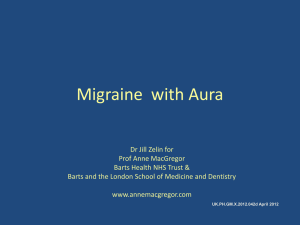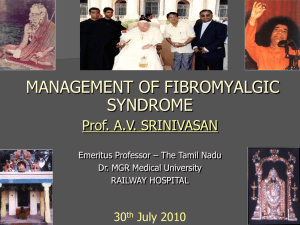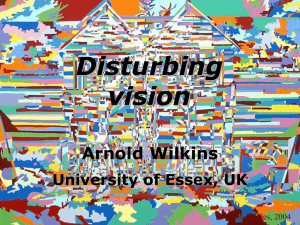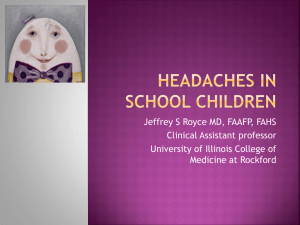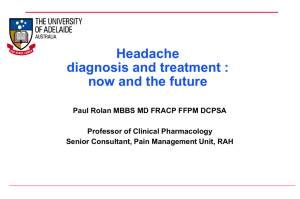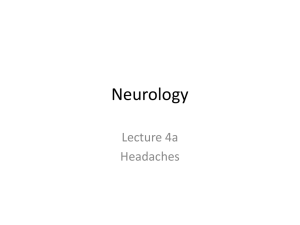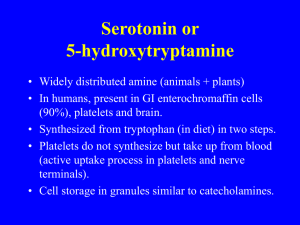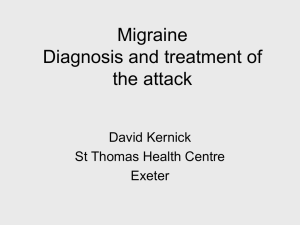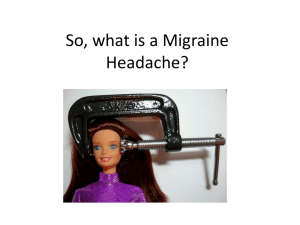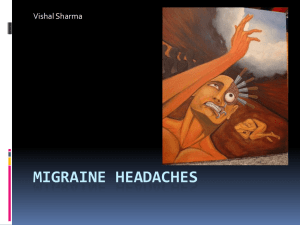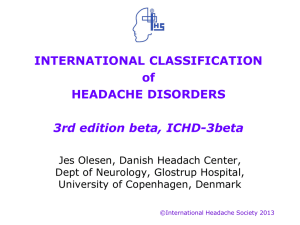Is ultrasound foam sclerotherapy contraindicated in
advertisement
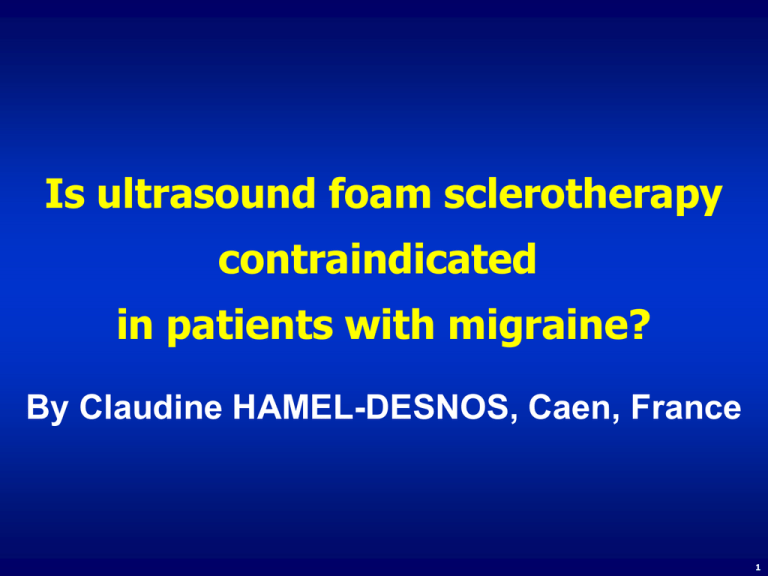
Is ultrasound foam sclerotherapy contraindicated in patients with migraine? By Claudine HAMEL-DESNOS, Caen, France 1 Should we treat varicose veins using UGFS* in patients with migraine? Meier B et al. Eur Heart J 2012;33:705-713 Foam *Abbreviations: PFO, patent foramen ovale; UGFS, ultrasound-guided foam sclerotherapy Patent foramen ovale MIGRAINE Neurological disturbances? 2 « The results of NOMAS can be seen as the strongest evidence against an association between migraine or migraine with aura and PFO » Kurth K, Tzourio C, and Bousser MG. Editorial 3 How does foam progress? • In vitro, 2 ml of 3% sodium tetradecyl sulphate are deactivated by only 1 ml of blood in a short period of time (15 s) • The sclerosing agent does not reach the brain circulation • Only “bubbles” remain Watkins M.R. Deactivation of sodium tetradecyl sulphate injection by blood proteins. Eur J Vasc Endovasc Surg. 2011;41:521-525. 4 Neurological disturbances • Visual (1.4%) • Migraine (4.2%) • Transient ischemic attacks • Stroke Mostly case reports Good recovery Jia X, Mowatt G, Burr JM, Cassar K, Cook J, Fraser C. Systematic review of foam sclerotherapy for varicose veins. Br J Surg. 2007;94(8):925-936. 5 What’s a migraine? 6 The International Headache Society migraine without aura: diagnostic criteria A. At least 5 attacks fulfilling criteria B-D B. Headache attacks lasting 4-72 hours (untreated or unsuccessfully treated) C. At least two of the following characteristics: – Unilateral location – Pulsating quality – Moderate or severe pain intensity – Aggravation by or causing avoidance of routine physical activity (eg walking or climbing stairs) D. At least one of the following symptoms: – Nausea and/or vomiting – Photophobia and phonophobia E. Not attributed to another disorder The International Classification of Headache Disorders. Cephalalgia. 2004;24:S9-S160. 7 The International Headache Society migraine with aura : diagnostic criteria A. At least 2 attacks fulfilling criteria B-D B. Aura consisting of at least 1 of the following, but no motor weakness: 1. fully reversible visual symptoms including positive features (eg, flickering lights, spots, or lines) and/or negative features (i.e, loss of vision); 2. fully reversible sensory symptoms including positive features (i.e, pins and needles) and/or negative features (i.e, numbness); 3. fully reversible dysphasic speech disturbance C. At least 2 of the following : 1. homonymous visual symptoms and/or unilateral sensory symptoms 2. 3. at least 1 aura symptom develops gradually over ≥5 min and/or diferent aura symptoms occur in succession over ≥5 min each symptom lasts >5 and <60 minutes D. Headache fulfilling criteria B-D for migraine without aura begins during the aura or follows the aura within 60 minutes E. Not attributed to another disorder The International Classification of Headache Disorders. Cephalalgia. 2004;24:S9-S160. 8 Pathophysiology of migraine associated with UltrasoundGuided Foam Sclerotherapy (UGFS) 9 Pathophysiology of migraine with aura (AM) Extensive cortical depression (propagated): Depolarization wave from the occipital cortex to the forehead (may be limited): occipital = visual troubles parietal = paresthesias frontal = speech troubles Endothelin-1 (powerful vasoconstrictor) = triggers AM 10 Endothelin and foam Varicose vein endothelium is damaged by foam and releases endothelin-1, which reaches the cerebral cortex via the PFO, triggering an aura. Visual disturbances are not transient ischemic attacks Gillet et al. Phlebology. 2010;25:261-266. Frullini et al. Phlebology. 2011;26:203-208. 11 According to expert recommendations: MIGRAINE WITH OR WITHOUT AURA IS NOT A CONTRAINDICATION FOR UGFS 12 Breu FX, Guggenbichler S, Wollmann JC. 2nd European consensus meeting on foam sclerotherapy 2006. Tegernsee, Germany: Vasa 2008;S/713-729. Berridge D, Lees T, Earnshaw JJ. The VEnous Intervention (VEIN) project. Phlebology. 2009;24 (suppl 1):1-2. 13 LITERATURE REVIEW 14 • 1023 articles analyzed • 41 articles retained reporting the presence of stroke, transient ischemic attacks (TIA) or visual or speech disturbances, migraine, cephalalgia (63% foam and 37% liquid) 12 cases of stroke No personal history of migraine described 9 TIAs 29 cases of migraine (0.27%) Sarvananthan T, Sheperd AC, Willenberg T, Davis AH. Neurological complications of sclerotherapy for varicose veins. J Vasc Surg . 2012;55:243-251. 15 16 17 There are insufficient data to determine the role of: The technique used to generate foam, The gas used, The volumes injected, The type of veins treated, The different types of measures taken to avoid complications • « The pathologic mechanisms resulting in CVA are likely to be different to those leading to migraine and visual disturbances » • « Precautions should be exercised particularly in patients with a known PFO and perhaps those known to suffer from migraine » Sarvananthan T, Sheperd AC, Willenberg T, Davis AH. Neurological complications of sclerotherapy for varicose veins. J Vasc Surg 2012; 55:243-251. 18 PRACTICAL RECOMMENDATIONS A symptomatic PFO is a contraindication for UGFS A personal history of migraine is not a contraindication for UGFS. However, it must be reported along with the presence or absence of aura Should migraine with/without aura occur after UGFS: • Treat the patient with his/her usual antimigraine treatment (or with NSAI) • In case of VDs, do not let the patient drive unaccompanied until the cessation of disturbances • The risk/benefit ratio should be reviewed before continuing sclerotherapy treatment (preventative antimigraine treatment?) In case of stroke: assessment (Doppler examination of the supra-aortic vessels, consultation with a neurologist, consultation with a cardiologist, MRI); pharmacovigilance report. 19 CONCLUSION • Neurological disturbances after UGFS should not be overlooked; however, they are usually AM variants • Strokes are rare side-effects and are not the result of the same underlying mechanisms; no link with a personal history of migraine has been established; stroke diagnosis must be confirmed • Currently, a history of migraine is not a contraindication for UGFS though it may contribute to the development of AM (or AM variant) • Further studies are needed 20

